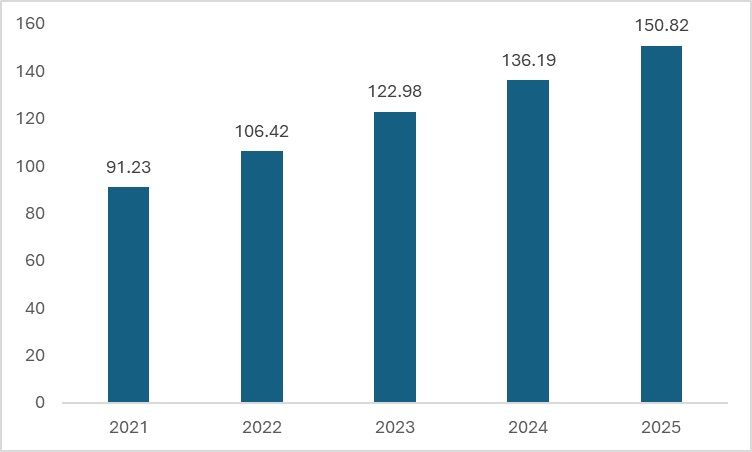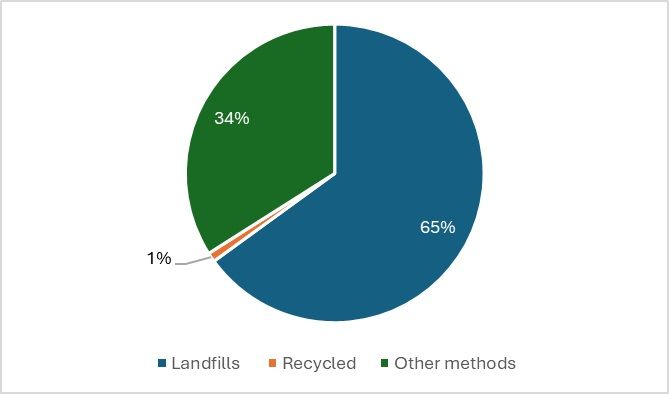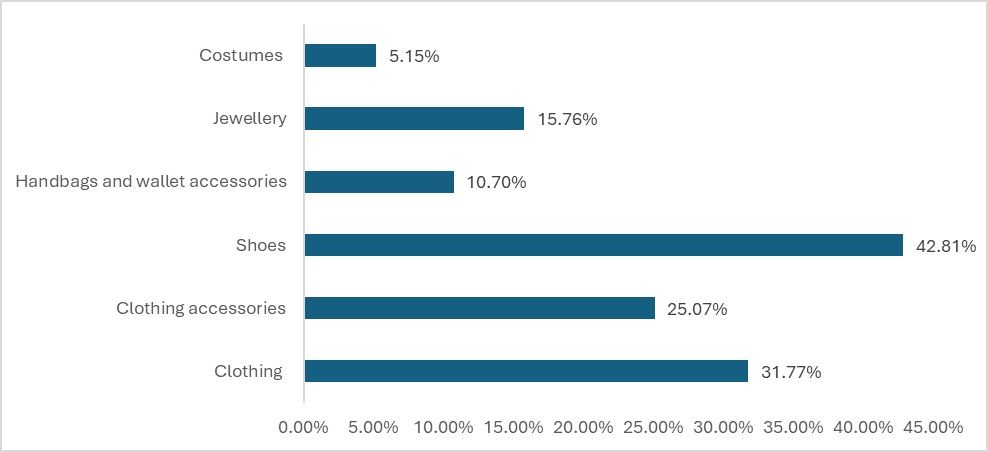
The fast fashion industry has experienced immense growth in recent years, despite the onset of economic crises and slowdowns. With cheaper options available to consumers, the market has gained more momentum. A major advantage is selling apparel at significant discounts, which attracts a large number of consumers. The industry constantly updates its collections to stay in line with the latest fashion trends and is growing globally. Its market size is estimated to reach $150 billion by 2025.
Figure 1: Global market size of the fast fashion industry (in $ bn)

Source: Statista (2024 and 2025 figures are predicted values)
The reason the industry is expanding so much is due to the easy and wide visibility, availability of clothing at lower costs, and seasonal discounts, making them irresistible to the average consumer. Especially with the emergence of the cost-of-living crises in various economies, more consumers are switching to cheaper apparel as a substitute for conventional, expensive ones. This has become the unique selling point (USP) for fast fashion. However, this industry is also responsible for environmental damage, of which many countries are becoming aware. France is one among many that have implemented some stringent measures against this.
Fast fashion & pollution
The fast fashion industry is proving hazardous to the environment. Although it is one of the most affordable clothing lines, it is also one of the most polluting sectors. Globally, the textile industry contributes to 10 per cent of total carbon emissions. Specifically, in France, the country discards around 700,000 tonnes of clothing yearly.
Figure 2: Method of discarding clothes in France (in %)

Source: SWEEP, F2F analysis
Out of those, approximately 455,000 tonnes of clothes are discarded in landfills, and 7,000 tonnes—a mere 1 per cent—are recycled. Figure 2 shows that approximately 65 per cent of the clothing is sent to landfills, which has a significant impact on the land and air quality.
Fast fashion is one of the most popular destinations for French consumers to buy apparel at high discounts. In fact, according to Stylight, almost 80 per cent of French citizens purchased clothes during the summer and winter sales. If we look at the restocking of fast fashion brands, it is updated weekly, compared to conventional brands, which update four times a year depending on the season. The speed at which the former updates itself also presents a problem of unused apparel, which is one of the major problems France is facing.
A new policy to curb fast fashion consumption
Considering the impact of fast fashion on the environment, the French government has decided to impose a fine on the purchase of fast fashion brands. For every unit of fast fashion apparel sold, a proposed fine of €10 (~$10.93) will be added to the product's price, thus increasing the cost of the items. The bill, proposed by an MP, is expected to be finalised by the second half of March. France is also considering banning or restricting the advertising of fast fashion brands.
The policy is specifically designed to target Chinese brands, which have gained immense popularity in the country due to substantial discounts. Apart from Chinese companies, other fast fashion brands are also targeted, with the cost economics being straightforward: if consumers cannot reduce their consumption, the increased cost will discourage them from doing so.
This policy shift also highlights the increasing discounts offered by online platforms on various product categories in France. According to estimates by the influencing market hub, globally, clothing is the second-highest discounted category after shoes. A penalty on fast fashion items will likely reduce the impact these discounts have on the consumer mindset regarding apparel spending.
Figure 3: Discounts on different categories in online retail (in %)

Source: Influencer Marketing Hub
Imposing a penalty on the sale of goods effectively results in an indirect increase in the price of those goods. With MPs proposing a penalty of up to 50 per cent of the total cost eventually, the price of clothing and apparel sold on websites will increase. This will significantly impact the consumer base, as, according to a survey conducted by e-commerce news, 70 per cent of consumers consider price while purchasing clothes online. If a penalty means passing on the cost to consumers, this will affect brands that sell apparel for as low as €5 (~$5.46) a piece or at significant discounts, thus yielding results in the long term.
Strengthening Sustainable Fashion
The logic applied here is straightforward. France aims to manage clothing waste and support brands striving for sustainability but are threatened by the emergence of fast-fashion brands, notably those from China. Therefore, the new policy intends to redirect French consumers' attention towards sustainable clothing. It aims to make eco-friendly garments significantly more affordable, thereby reducing the consumption of fast fashion and its potential environmental impact. Although the penalty is a recent development, the French government has previously endeavoured to promote sustainable fashion.
In 2023, the government introduced a policy designed to incentivise consumers to repair and reuse clothing by offering bonuses ranging from €5 to €25 (~$5.46-$27.31). This initiative had two main goals: to foster sustainability and to provide additional support for French brands. However, the full impact of this policy remains to be seen.
In 2023, France, along with other countries, addressed concerns regarding apparel sustainability. For example, the European Union implemented regulations that forbid the disposal of unworn clothing and advocated for sustainable design to enhance durability and minimise environmental impact. Furthermore, in January 2024, the EU introduced legislation to combat greenwashing, which aims to regulate companies making misleading environmental claims. Concurrently, the United States is reviewing the proposed New York Act, which, if enacted, would require fashion retail companies to disclose their entire textile value chain, including compliance with labour laws, thereby promoting traceability and transparency throughout the industry.
ALCHEMPro News Desk (KL)
Receive daily prices and market insights straight to your inbox. Subscribe to AlchemPro Weekly!